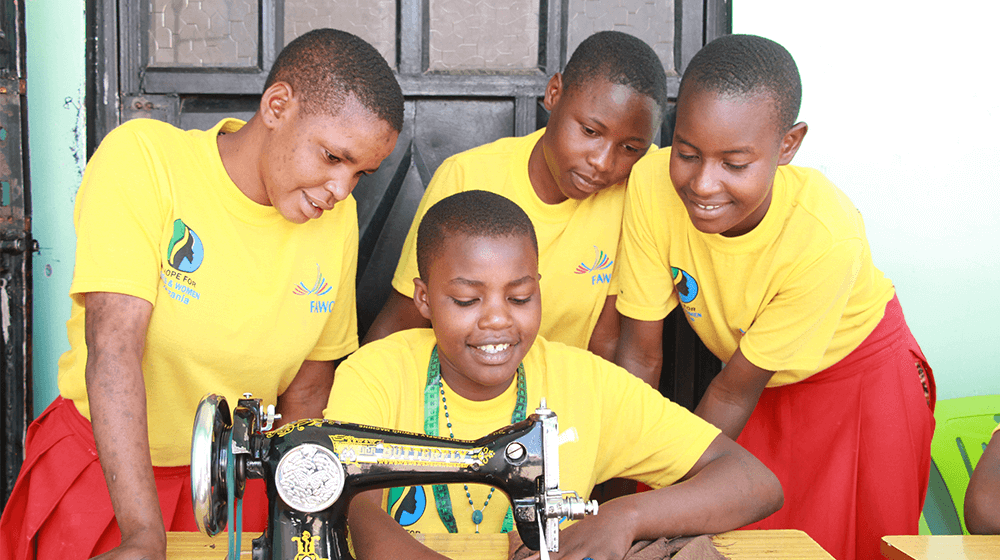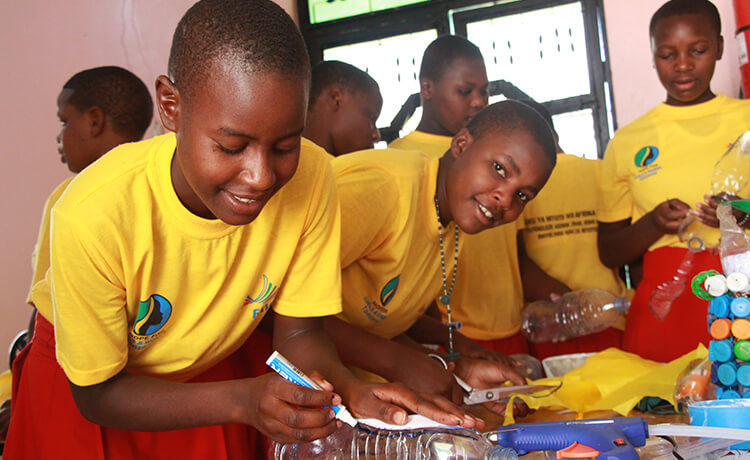Tanzanian Youth Activist Rallies for Gender Equality

MASANGA, United Republic of Tanzania – “If only we had a community free from gender-based violence, teenage pregnancy, child marriage, and female genital mutilation, then all girls would be able to achieve their dreams,” Bhoke*, a Tanzanian youth activist, told UNFPA.
Bhoke lives with her mother and two siblings in the village of Masanga, in the Mara region of the United Republic of Tanzania. At just 18 years old, she has witnessed firsthand how gender inequality robs women and girls of opportunities.“I have seen many girls drop out of school because of female genital mutilation, child marriage, and teenage pregnancy. It hurt me so much,” she said.
In Tanzania, Female genital mutilation is less common now, but it still affects about 8% of women and girls aged 15 to 49. In 2019, nearly a third of Tanzanian girls experienced forced child marriage. Almost a quarter of those girls became mothers before their eighteenth birthdays. Meanwhile in 2022, almost 4 in ten women reported that their current or most recent partner physically, sexually, or emotionally abused them.
Bhoke’s desire for change sparked when she crossed paths with Bernard in 2022. He was a passionate volunteer for an organization called the The Chaguo Langu Haki Yangu: My Choice, My Rights Program. Funded by Finland and supported by UNFPA, the program is dedicated to empowering youth with knowledge about their rights. Inspired, Bhoke swiftly decided to join forces with him. Soon after, she was offered the opportunity to become a leader on gender equality in her community.
“The program taught me about girls’ rights and how to stand up for mine, and that gender-based violence is a violation of human rights. It also helps me make safe decisions about my sexual health,” she said.

Spreading the word
Bhoke pondered ways to share the program’s knowledge with students at her school. In November 2022, she and Bernard organized a campaign to promote the 16 Days of Activism Against Gender-Based Violence.
They conducted a two-day training session at Bhoke’s school and reached 150 students with educational resources on preventing violence. After that success, Bhoke founded a weekly club to further educate herself and her peers on gender equality and advocacy.
Bhoke is now a community leader in her own right. She has earned the trust of fellow students who turn to her for advice on dealing with violence.
A fellow student named Tomondo* confided in Bhoke about the sexual abuse she experienced from a family member at home. “I informed Tomondo about her rights, and built her confidence to report her case to the police,” Bhoke explained. “She agreed to report her abuser, who was arrested. Now the case is in the hands of the local government authorities.”
Tanzanian youth activists demand equality for all
Despite progress, challenges persist for Tanzanian women and girls like those in Bhoke’s community. In Mara, female genital mutilation rates are three times higher than the national average. Half of women over 15 have reported experiencing some form of violence.
Tanzanian youth activists like Bhoke are working hard to change the trajectory of girls’ lives in Mara. Their advocacy work, paired with participating in programs like Chaguo Langu Haki Yangu, has had a tangible impact on their community. Between 2015 and 2022, the region’s rates for intimate partner violence dropped from 78% to 66%, while the prevalence of female genital mutilation and adolescent pregnancy also declined.
Bhoke is determined to end the violence in her community. She wants to pave the way for all girls to pursue their dreams. Her ultimate goal is to become a doctor so she can safeguard women’s rights to live healthy lives free from violence.
“Things will change if girls learn about rights and choices and how to say no. It will enable us to empower young women and adolescent girls, including those with disabilities, to claim their rights to be protected from any form of violence and harmful practices.”
*Names changed for privacy and protection.